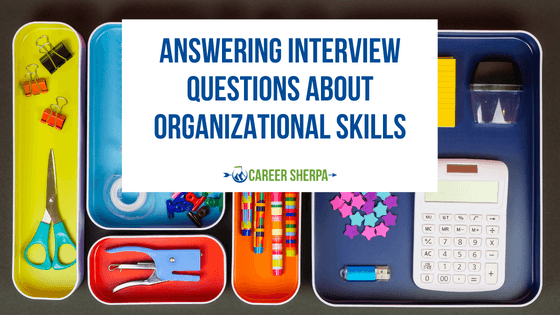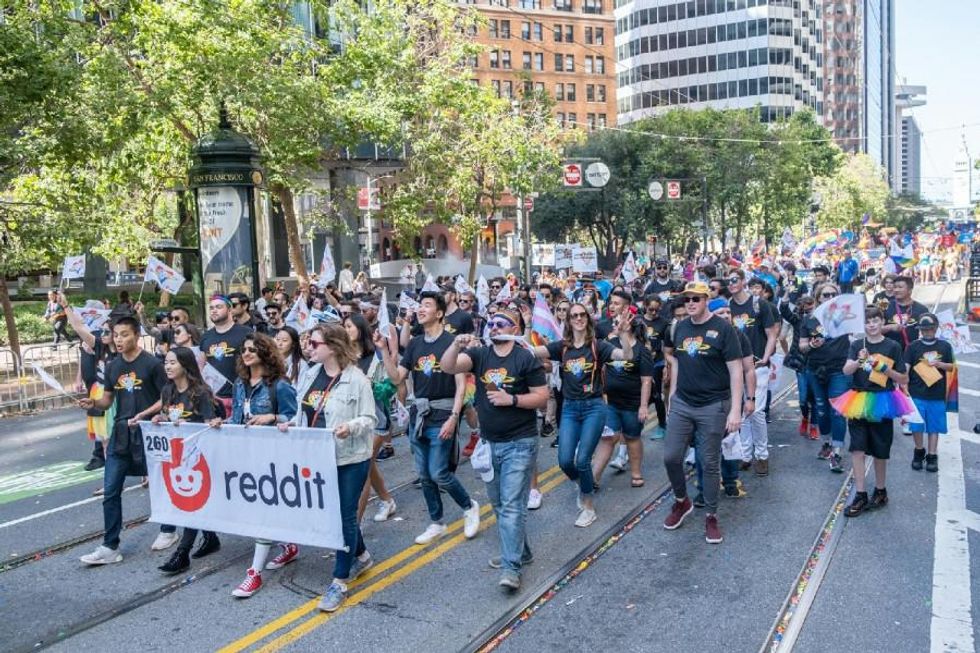Answering questions about your organizational skills in a job interview is something that everyone needs to do. Staying organized is an essential part of being a productive employee, so hiring managers will always bring this up!

This guide will teach you how to talk about your organizational skills in a way that makes a great impression and improves your chances of getting hired.
Table of contents
How to Answer Interview Questions About Organizational Skills
Questions about your organizational skills are bound to come up during a job interview, regardless of the field or position. Organizational skills are valuable and a key trait many hiring managers look for when considering applicants. When responding to these questions, it’s important to put your skills on full display while highlighting how you can apply them to the job at hand.
Here are a few tips to help you do just that.
1. Demonstrate That Staying Organized is Important to You
Hiring managers and interviewers are always interested in your unique organizational methods. Every employee has an approach they prefer, and it’s usually fine to do whatever works for you. But the most crucial thing they want to hear is that you value staying organized when you work.
They want to see that your organizational skills are effortless and second nature. You’d be surprised how many people approach their work without a method to keep them on track. While those individuals might cross the finish line and successfully finish a task that they’re working on, they often take longer, work inefficiently, and get side-tracked.
When answering interview questions about your organizational skills, your goal is to show that it’s vital to your success. Demonstrate why staying organized matters and how it makes a difference in your professional life.
There are many ways to do this. You can talk about how staying organized during past experiences helped you see better results than your peers. Alternatively, you could go into detail about how those skills played a part in your previous accomplishments.
Highlight how staying organized has made a difference in your career, and show that you plan on bringing those skills to the table if offered a job.
2. Break Down Your Organizational Approach
Another way to create a memorable answer is to detail how you stay organized. What approach do you use, and what techniques have helped you succeed in your past jobs?
Organizational skills can be highly personal. While many tried and true techniques exist, people develop methods that complement their needs and workflow. Don’t be afraid to talk about what you do, even if it’s a little outside the box.
Describing your techniques serves a few purposes. For starters, it shows that you genuinely practice good organizational skills in the real world.
Interviewers know that people prepare carefully crafted answers to make them look good. But when someone talks about real-world experiences, it shows authenticity and honesty.
Secondly, it gives the interviewer a glimpse into how you work and what kind of a fit you might be. Your response can show what you’ll bring to the mix and how your skills could positively influence the rest of your team.
Of course, be concise. It’s never a good idea to provide a long-winded answer. Spend some time creating a thoughtful and quick response. And don''t use a hypothetical scenario. Retell a a real situation. Walk the interviewer through your thought process step by step. Recite it a few times in mock interviews to get comfortable providing that information without rambling or taking too much time.
3. Give Some Examples Where It Has Been Helpful
There’s no better way to illustrate your organizational skills than to provide real-world examples. Reflect on your career and provide examples of how being organized benefited you.
Maybe you applied your skills to meet a super-tight deadline or finish a last-minute task no one thought you could. Or perhaps you juggled multiple projects at once without breaking a sweat because you applied your organizational skills to stay on top of everything. You likely have moments like those in your past.
We rarely think of them as accomplishments until interview questions like this come up. Reflect on your biggest successes, and there’s a good chance that your organizational skills played a part in making them happen.
Describe how you applied your skills and why. Then, direct the conversation to the job you’re interviewing for, and demonstrate how you can do the same in the new position.
4. Make It Clear That You Can Be Flexible
Our last tip is an important one. While interviewers admire inherent organizational skills, they also want to see flexibility. Someone who’s too stuck in their ways to adapt to a new workflow can be difficult to work with.
Companies want employees who can adapt and work as efficiently as possible in each situation. That may involve adopting new organizational approaches you’re not used to using, so the worst thing you can do is appear inflexible.
Make it known that you can adapt and change your organizational techniques if needed. Consistently demonstrate that organization is a priority, but don’t be so hard-set in your ways that you come off as incapable of adapting.
Organizational Skill Questions & Answers
Interviewers can inquire about your organizational skills in many different ways. There’s no universal question that will give them everything they''re looking for. Some may ask about your daily routine, while others want to explore the specific organizational skills you used in previous jobs.
Using the tips from above, you have all you need to provide an impactful answer to any question. But here are some common questions and example answers to inspire your own.
Would You Call Yourself an Organized Person?
This is a straightforward interview about your organizational skills. The interviewer wants to hear it from you first, so give them a good answer!
“I do consider myself an organized person. I like to approach every project with a clear strategy and a structured plan of attack. Whether knocking off small tasks on a daily to-do list or working on a months-long project, staying organized helps me keep my ducks in a row and complete every endeavor successfully.
While I am flexible enough to adapt my techniques around the unique tasks at hand, I ensure that I’m methodical and organized in everything I do.”
How Do You Prioritize Your Tasks at Work?
This question dives into the process from a high level. It helps the interviewer understand how you stay organized, and envision how you might apply your organizational methods to the job you''re applying for.
“In our line of work, every day can be different. As a result, I always start my day by reviewing the work I completed the previous day. That allows me to see what tasks I still need to finish to stay on schedule.
I then insert those tasks into my daily planner before meeting with my manager to see what urgent tasks require my focus. Before I start any work, I assess the tasks on my daily planner and put the high-priority projects first.
From there, I can look at what I need to do, figure out an efficient work schedule, find time to take on new priority assignments, and start knocking out tasks.”
What Organizational Systems and Methods Do You Like Using?
While similar to the question above, this inquiry is a bit more detail-oriented. Feel free to dive into any specific organizational methods you use to help you stay on track.
“I consider myself to be quite adaptable. As long as there’s a clear structure to the organizational system, I find that I fall into the swing of things pretty easily.
That said, my go-to is creating lists and planned schedules. When I first started at my previous company, the team had a “free for all” approach. We would receive tasks of varying priority throughout the day, and my colleagues would pick and choose what they wanted to work on.
That resulted in many productivity issues. I decided to organize tasks by urgency, insert them into daily and weekly planners, and create an efficient work schedule. That made my team more efficient and ensured that every task was completed on time.”
How Do You Make Sure You Meet Deadlines?
No matter where you work, deadlines are waiting. By seeing how you look ahead to ensure that projects get done on time, the interviewer can see if your approach is a good fit for the position.
“I use several organizational methods to keep projects on track.
In my last role, I ensured large projects went smoothly. I broke the projects into manageable chunks. I then looked at those tasks and created a weekly schedule to help me stay organized. I used that schedule to determine how long each component takes to complete, when I need to do them, and deadlines.
Prioritization is another technique I use. Some tasks come with tighter deadlines, and I use those to adjust my schedule as needed.
After creating a plan of attack, I take advantage of digital calendars, reminder notifications, and other time-tracking tools. Typically, I work to complete every project a day or more before the official deadline. That way, I have time to review my work and ensure I’m submitting the best final product possible.”
What Tools or Software Do You Use to Keep Yourself Organized?
For many of us, staying organized with strictly pieces of paper is a thing of the past. Use this as an opportunity to show what you use to stay organized in the modern age, but don''t miss the opportunity to show that you''re familiar with project management software that gets used by companies internally.
'I use a mix of analog and digital tools to stay organized. For me, leaning on both technology and old-school methods provides a nice balance.
Generally, I create to-do lists using pen and paper. I keep those lists in front of me at all times and often post them on my desk for easy visibility.
Once I understand the tasks I need to do, I will use digital calendars and reminders to create a schedule. The software I use automatically syncs to my smartphone and tablet, making it easily accessible no matter what I’m doing. I''ve used a variety of project management software at my previous jobs, so I''m comfortable adjusting to new digital workflows.”
Tell Me About a Time When You Had to Work on Multiple Projects at Once
Here''s a fantastic chance to talk about your organizational skills in action. The interviewer wants to see if you''re able to keep moving efficiently even when things get chaotic.
“One of the more complex projects I completed last year with my former company was revamping an old website for a client. The website was last updated well over a decade ago, so it required a complete overhaul. That involved creating new content, generating marketing material, designing the site to meet modern aesthetic standards, and more.
It was a big undertaking, but I managed to complete it successfully by breaking it up into more manageable stages. I devoted several weeks to content creation, one to web design, and so on. Within each stage, I split the project into smaller tasks and set strict deadlines.
Within eight weeks, I had a finished product that the client loved.”
Tell Me About a Time When Being Organized was Essential for Completing a Project
This is another straightforward interview question about your organizational abilities that you''ll need to be ready for. Think back on a time when things could have easily spun out of control if you weren''t on track and talk about it!
“Many of the projects I work on need some level of organization. Recently, I completed a new marketing campaign for one of my former firm’s biggest clients. The client was set to launch an entirely new product line.
I was in charge of completing the digital marketing campaign for that launch. Given the client’s extensive online presence, creating a successful digital campaign involved producing content for multiple sites and social media platforms. Good organizational skills were critical to my success in that project.
I looked at the campaign requirements, split tasks up based on content type and platform, and created a schedule to ensure that all deliverables were ready upon launch.”
How Do Your Organizational Skills Help You When Working with Others?
Collaboration is required for many of us. Even if you have a remote job that doesn''t require a lot of direct interaction with others on a daily basis, you''re likely part of a larger team. Interviewers want to know that you can not only keep yourself organized, but you can do it in a way that allows you to work with your coworkers efficiently as well.
“Collaborating with colleagues can be difficult when projects are poorly organized. I found that having a well-executed strategy is key to avoiding conflicts and maintaining a high level of self-accountability. I often use organizational techniques when leading projects.
I create schedules, dole out tasks based on urgency, and maintain manageable deadlines. Good organizational and communication skills provide transparency. Everyone knows what they need to work on, what expectations are on them, and when they need to submit their work.
It eliminates confusion and is the fuel that keeps teams running like a well-oiled machine.”
How Do You Develop a Plan for New Projects?
This question aims to get a look at your preferred organizational methods when it comes to laying things out. It''s a bit different than keeping the details straight for smaller tasks!
While you should take all questions seriously, this one can be especially important if you''re applying for a managerial position.
“When I approach new projects, I always look at client specifications, company expectations, and deadlines. That information helps me understand where the priorities are and how our team can fulfill them. From there, I can create a formal plan of execution that meets the needs of all stakeholders.
Projects can have varying degrees of complexity. But understanding the expectations, specifications, and deadlines is the foundation for developing a strategic and well-organized plan of attack.”
Common Mistakes When Answering These Questions
Interview questions about your organizational skills might not feel like a big deal at the moment since they offer tons of flexibility to highlight your capabilities. However, there are some red flags you must avoid.
Here are some faux pas you want to avoid.
Implying That You Thrive in Chaos
One of the worst things you can do is say that you have no organizational skills or imply that you don’t need them. Everyone works differently, but companies need well-organized workers to thrive. Even if you do fine with a less structured approach, a lack of organization will cause issues later.
Implying that you do well with chaos isn’t a good look. Not only does it tell the interviewer your workstyle probably isn’t the right fit, but it also implies that you simply don’t care enough to try being organized. In most cases, a response like this will pull you from the running.
Coming Off as Inflexible
Earlier, we talked about the importance of flexibility. Companies want people who can adapt to new techniques and methodologies.
You might have your preferred way of doing things. There’s nothing wrong with that, and you can say such during your interview. But you should always choose your words wisely to assure the interviewer that you’re flexible enough to change if necessary.
Providing Lengthy Responses
Leave the long-winded responses at the door! Interviewers are interested in learning more about your organizational skills but don’t need every little detail.
Keep your responses short and to the point. You can dive into detail without rambling. There’s only so much time to talk, so you must keep your answers brief. Practice providing all the information you want in as few words as possible!
Closing Thoughts
As you can see, knowing how to showcase your organizational skills in a job interview is crucial. If you take some time to practice these tips, you''ll become a much more competitive applicant!
The post Answering Interview Questions About Organizational Skills appeared first on Career Sherpa.












